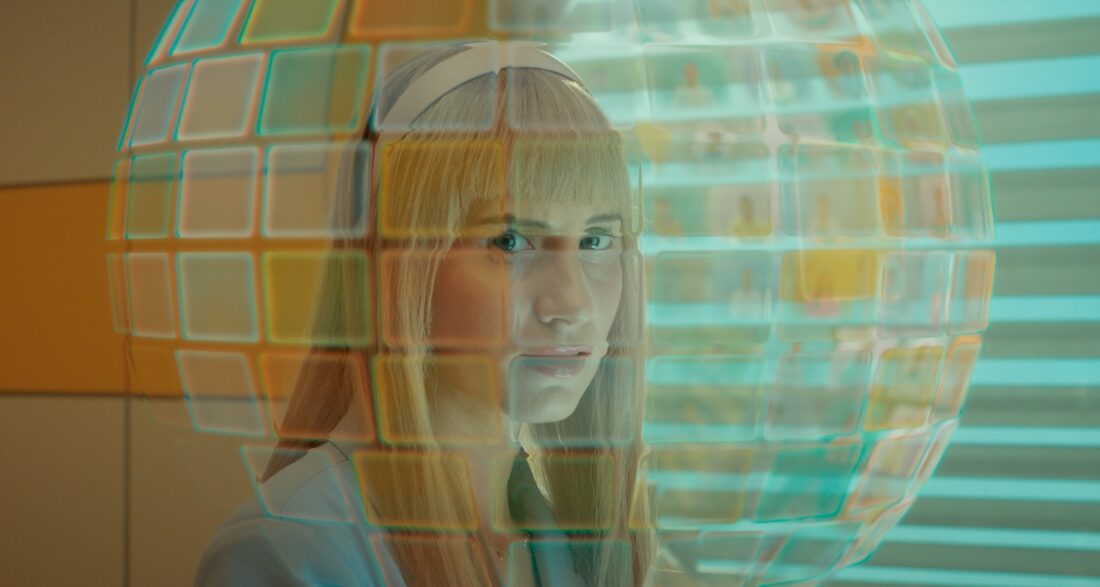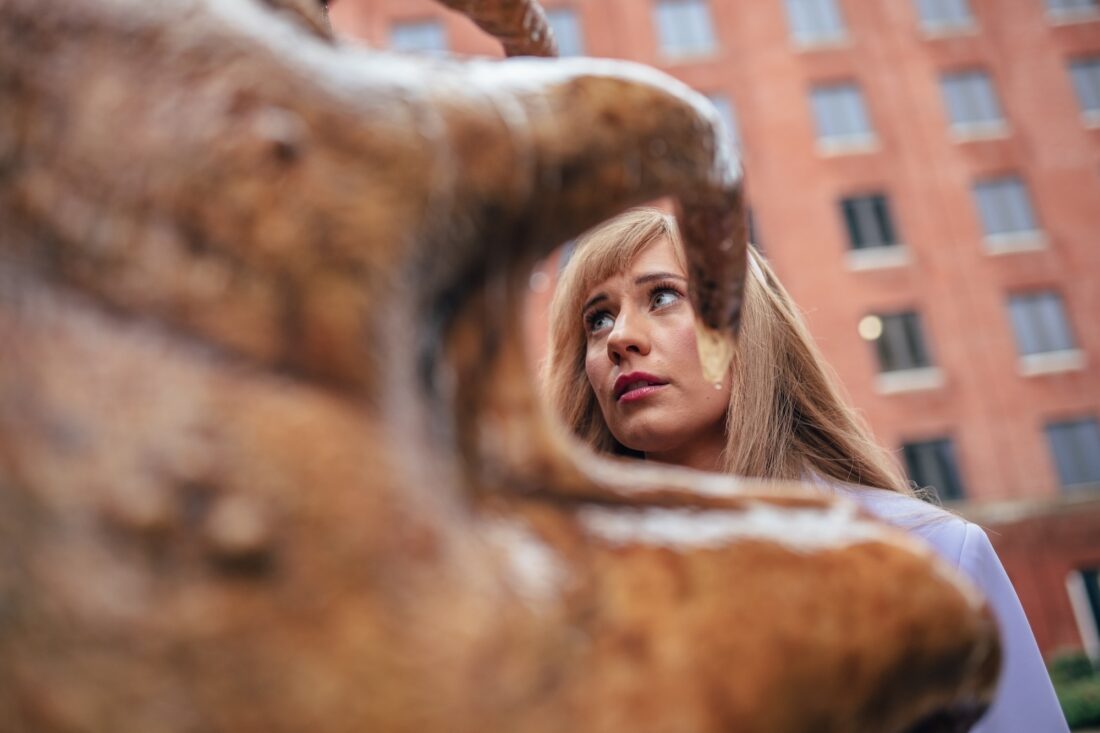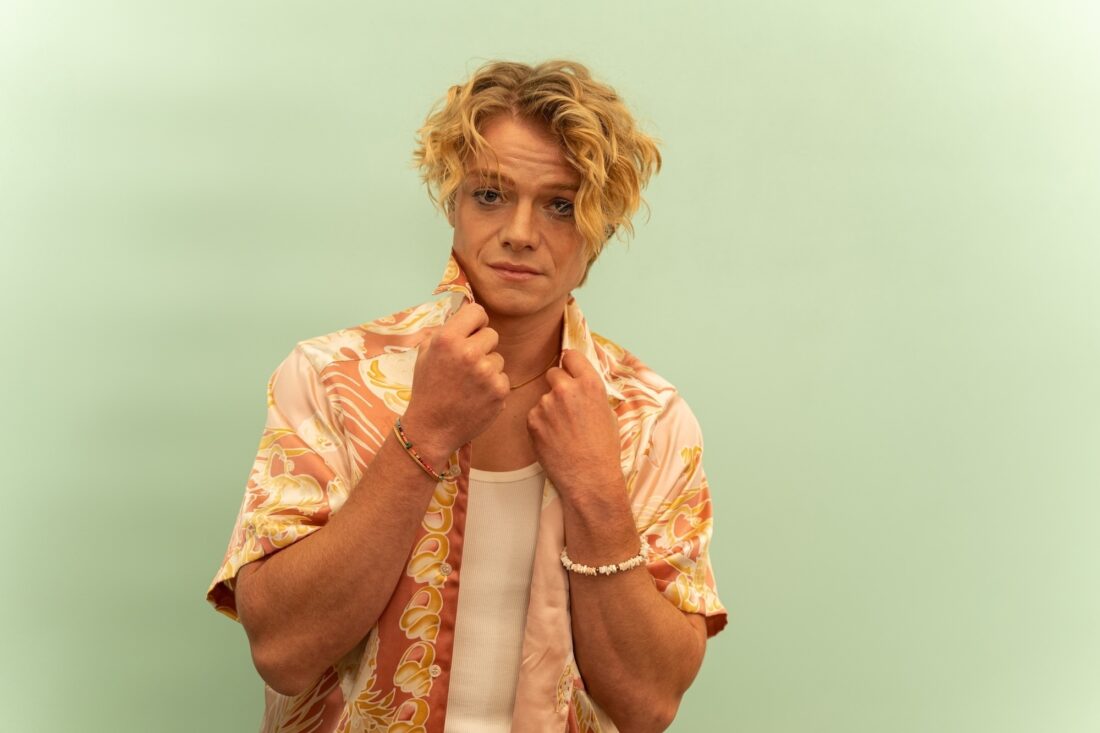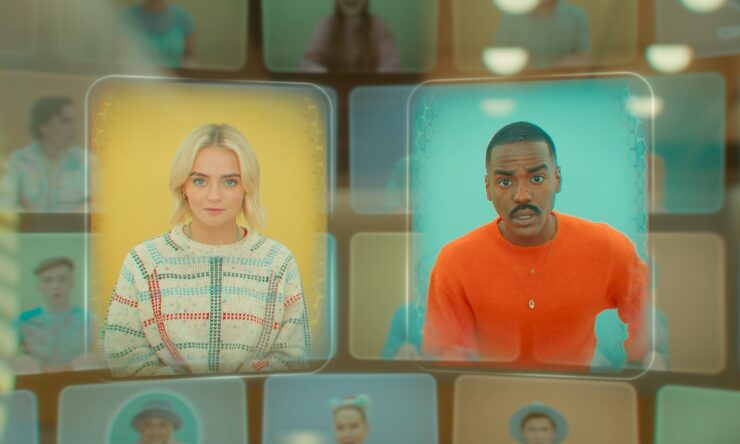This week seemed like it was going to be all cute aesthetics with horror beneath… they sure fooled us.
Recap

Lindy Pepper-Bean (Callie Cooke) awakes in Finetime, a city of wealthy white young people protected from the Wild Woods by a bubble shield. The denizens all go about their lives inside virtual bubbles where they maintain constant contacts with their friend lists via video. They work two hours a day, and then party for the rest of it, and are directed through the environment by their bubble, never looking outside of it. Lindy’s friend Gothic Paul (Pete MacHale) tells her that their friends are disappearing, but Lindy isn’t interested in that; she’d much rather watch the local influencer Ricky September (Tom Rhys Harries) and do her work. The Doctor pops up in her bubble, but he’s not on her friend’s list, so Lindy blocks him.
Ruby appears while Lindy is working and claims she works in maintenance. She asks Lindy to turn off her dot and drop her bubble and see what’s outside. Lindy sees a large slug monster eating her coworker. The Doctor and Ruby tell Lindy to drop the bubble again and get out of the building, but Lindy can’t walk without the bubble directing her. She encounters another slug creature, but it doesn’t eat her, and the Doctor can’t figure out why. He tells Lindy to make her way to the evacuation area via conduits underground. Lindy gets stuck and runs into Ricky September IRL. He saves her and admits that after he uploads videos, he logs off immediately to read and learn. Ricky uses the computer system to check on their Homeworld—all these young people were sent to live in Finetime by wealthy parents—but he discovers that Homeworld was already overrun by the slug monsters. He doesn’t tell Lindy.
Ricky and Lindy make it underground and the Doctor instructs Ricky to plug in numbers at the door leading to the evacuation area until it unlocks. The Doctor and Ruby finally work out that the people in Finetime are being eaten in alphabetical order, leading them to work out that the slug monsters were created by the dots; the technology they created has grown to hate them. Lindy is unfortunately next on the list, and because there are no slugs down there, her own dot weaponizes and tries to kill her. Ricky tells Lindy to work on the door lock while he fights it off. As the door opens, Lindy tells the dot that Ricky September changed his name, and his real surname is Coombes—he’s the next on the alphabetized list. The dot kills Ricky while she escapes.
Lindy finds the few survivors remaining underground with the Doctor and Ruby and the TARDIS. The group is preparing supplies to leave, ready to tame the woods outside. The Doctor insists that it’s too dangerous out there, and asks the group to come with him. All of them are mortified by the idea: The Doctor is an outsider, and they already feel contaminated by allowing him this close. The Doctor tells them that he doesn’t care if they continue to believe that, and offers them the chance to escape again, somewhere they can be safe. The group refuses in disdain, and leave on their boat. The Doctor cries and screams, and leaves with Ruby.
Commentary

Oh yeah. Yes. Keep going.
Let’s get the less heavy stuff out of the way first: Apparently, this episode was originally designed for Eleven’s tenure (which, that would’ve been an entirely different circus, huh?), but cut because the effects needed would’ve cost too much. That work is on display here, and it’s one of the few places where I’ve actually appreciated the Disney money thus far because it gives the environment that extra plastic sheen. The fact that the “monsters” of the episode are practical effects (there are three people working those slugs at a time!) and also aren’t really the monsters of the episode at all, it’s so good. The story also has that limited-scope feel of so many of the best Who episodes, with only two characters really getting most of the screen time and the Doctor and Ruby on the periphery of things.
I know that some folks weren’t pleased with the Gen Z style dialogue on this one, but that critique doesn’t hold for me because it’s so important that the sickly parody of social media culture be too heavy and reach a little too hard. The misdirect of the ultimate theme in the episode is more effective when its initial salvo of critiquing social media doesn’t entirely work. I had a moment in the beginning of internal eye rolling at Lindy’s resistance to the concept of “dropping your bubble,” like yes, okay we get it, har har. Everything about it is just on the wrong side of overdone, which is the perfect distraction.
The aesthetic works in favor of this, and so does Callie Cooke’s outstanding performance; she leans into the vacancy with intention, so that it’s hard to tell where the portrayal is headed. And the arc here is working to misdirect us because we’ve seen Doctor Who guest stars do the opposite of what this story entails—we’ve watched people learn and change and grow into a better destiny due to meeting the Doctor, so we’re primed to assume that will be the direction things play out in.
The story is poking at the audience too, in its depiction of these things. What annoys us about how social media is portrayed here? Is it actual missteps (which are there, in fairness) or is it simply having to acknowledge the inherent nastiness that the landscape engenders and how often it encourages our worst impulses by design? And more importantly—did you or did you not notice that every single person on the screens in Finetime was white?
It’s the first glaring clue, and it’s literally projected at us from every angle immediately. And there are clues about Lindy, too, but we’re inclined to dismiss them: As Ricky points out, she’s saying this is the best day of her life while all of her friends are being eaten. She tries to ignore the Doctor from the very start for not “belonging” in her bubble, but is more receptive to Ruby invading it. The script gives us outs, ways in which we can twist her meaning to make the answer for her behavior something more benign. Which is, in turn, often what we do when we encounter behaviors that could be the result of malignant prejudices.
We are left to make up our own minds until the point when Lindy sells out Ricky to save herself. And even then, we still aren’t sure of the purpose (if any) around that reveal. We only get to sit with the discomfort of having spent the entire episode with her—another important choice in the framing. This is another Doctor-lite episode and it’s better for the fact that we’re being given the entire plot through Lindy’s eyes. Encouraging the viewer to fully engage with her point of view, perhaps even empathize with her plight, is the surest way to give the ending its maximum impact.
But before we get into that ending: Whatever this episode achieves, there are still no Black writers working on Doctor Who this season, or any POC writers at all, for that matter. That needs to be said because the show can still and always do better, and that’s a particularly glaring place to start. Regardless of that, racism is still something that the show needs to continually reckon with, particularly with their current leading man. And this episode manages that need in a way that doesn’t feel clichéd, tidy, or weakened for audience comfort.
In fact, the end of this episode is perfectly calibrated devastation. And that matters coming off of Thirteen’s tenure, where sexism only got the barest wave in a couple episodes, and even then was never handled emotionally for the Doctor at all. It matters because even after all that he’s been through, this is the first time the Doctor has been told ‘no’ with such blatant, sickened disgust from the very people he would help. It matters because it’s this Doctor, who occupies this body and is also a supernova of compassion. He will be hurt by this in a way that would have hurt so few of his previous faces.
It matters because he was willing to take that abuse from them, and they still said no. It matters because the racism implied here is technically an allegory—their objections are to the Doctor being an “outsider” to Finetime—but oh-so obviously not one at all when they call the TARDIS “voodoo,” and talk about “taming” the world outside like their ancestors, and all the white kids get in their damned Mississippi paddle-steamer-looking boat to head into the great unknown. And Ruby can do nothing but stand next to the Doctor and watch him hurt because none of this was directed at her.
It matters.
It fucking matters.
And it was there right from the start. Along with all the things that play into that supremacy: the wealth, the unattainable beauty standards, the consumerism masquerading as activism, and the constant looking away from anything that makes us uncomfortable or frightened or confused. It’s all part of the same circuit.
So yeah, it’s a little blunt in places. But it’s a gorgeous piece of work, this episode.
Time and Space and Sundry

- This episode has quite a bit in common with “Gridlock” and also with “The Long Game” and it’s ensuing follow-up in “Bad Wolf,” with its themes of pacification of the masses and how various forms of media can be used to control us. Similarities to Black Mirror certainly fit the bill as well, but Doctor Who is always Doctor Who in that.
- One of my favorite things about the episode is the use of color and light—the way everyone in Finetime is bright enough to be on camera all the time, and depicted in the soft colors we see so frequently on social media. But even better in its rendering of that is the makeup—literally from the moment Lindy appears on screen, she looks oddly yellowed because her makeup had been so heavily and obviously applied, only for it to instantly come clear that this was intentional.
- Of course, Susan Twist is back, this time as Penny Pepper-Bean. Who is she? How is she tied to Ruby?
Next week we’ll be back with “Rogue”…










